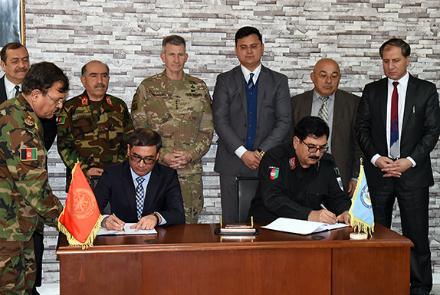Defense Minister Tariq Shah Bahrami on Tuesday signed an agreement to put into force a Child Protection Policy as a big step to shield children from the effects of armed conflict, Resolute Support said in a report on Tuesday.
The initiative is the outcome of a significant, year-long Afghan-led effort to codify measures to provide for greater protection to children. This includes preventing the use of violence against children by involving all personnel in the Afghan National Army, its associated civilians and contractors in the Ministry of Defense, the report said.
The report added that the policy sets out procedures for monitoring, reporting and investigating violations by all Ministry of Defense staff and declares the intent to hold those who commit crimes against children accountable.
“The NATO mission will continue to lend training advice and assistance to work with the Afghan military as well as with the UN and the international community to see that the child protection policy is fully embedded into the Afghan military’s operations,” said General John Nicholson, the Resolute Support commander.
“Under my watch, I’ve already made it clear and now I’m going to make it very clear: If soldiers under my command – the US or any of the 38 other Troop Contributing Nations providing forces here – are witness to any gross violation of human rights, they have a duty to report immediately. We have improved our training and our own policies and procedures, and fast-tracked our efforts to make sure that we have the right tools in place to make it easier to report, and easier to follow up,” Nicholson said.
Swen Dornig, the special advisor to Gen. Nicholson on children and armed conflict – a first for the NATO-led mission in Afghanistan – has been an active interlocutor helping inform the development of the Afghan child protection policy and bringing additional focus to the effort within Resolute Support.
“NATO policies and guidelines to embed child protection within the larger framework of protection of civilians, are relatively recent. We know that children are especially vulnerable during the conflict and disproportionately affected by violence.
“It is for this reason that we are trying to ensure that our efforts protect both boys and girls from violations during the conflict,” said Dornig. “Regional organizations such as NATO have a responsibility and role to ensure the protection of children in conflict settings. The protection needs are vast, and a coordinated approach is needed.”
In January 2017, Gen. Nicholson met in New York with the Special Representative of the UN Secretary-General for Children and Armed Conflict to discuss measures, in partnership with the international community to improve the situation of children in Afghanistan.
Within Resolute Support, relevant pre-deployment and in-theatre training of personnel have been improved and instruction is now included in pre-deployment training taking place four times a year at NATO’s Joint Force Training Centre in Bydgoszcz, Poland.
In addition, children in armed conflict training are provided twice a year to incoming key leaders, and twice a month to incoming advisors to the train, advise, assist mission. Personnel can also access an online NATO-distributed learning course on Children and Armed Conflict developed with the support of the United Nations in New York.
Child protection focal points in each of the military regions and functional areas have also been established, providing the means to support related programming and initiatives throughout the country and to monitor and report through the chain of command.
A new, common, web-based database is being implemented specifically for NATO personnel to quickly report all human rights-related cases and allegations that they observe during the TAA mission in Afghanistan.
This database will improve information sharing amongst the various systems and respective offices within the Coalition. It was designed in support of UN reporting mechanisms and is additionally supportive to US Leahy Law tracking requirements. It will enhance existing mechanisms to account for all gross violations of human rights, including children and armed conflict violence, as well as sexual and gender-based violence incidents across Afghanistan observed by NATO personnel.
In addition, Resolute Support personnel continue to support various senior Afghan officials and institutions including Afghanistan’s Office of National Security Council, to address instances and allegations of human rights abuses of youth in custody.
According to the United Nations Assistance Mission in Afghanistan (UNAMA), child casualties remained at high levels during the first six months of 2017, accounting for 30 percent of all civilian casualties.
Attacks on schools and hospitals by the Taliban, Daesh and other terrorist groups pose a serious security risk to children, as well as impeding access to education and healthcare, the UNAMA report says.
The UNAMA report says that poverty continues to push children towards recruitment by armed actors. The Afghan National Police have arrested members of human trafficking rings, saving dozens of children intended to be smuggled into Pakistan to be trained as suicide bombers for the Taliban.
“Despite formidable challenges, the Government of Afghanistan has recently demonstrated commendable progress towards ending and preventing grave violations against children,” said Gen. Nicholson. “The deliberate targeting of children by Taliban and Daesh must stop. We stand with our Afghan partners to make Afghanistan safer for its children, the country’s most precious resource and future.”


